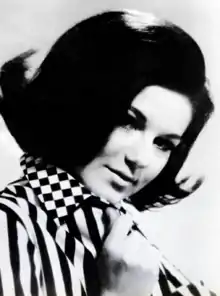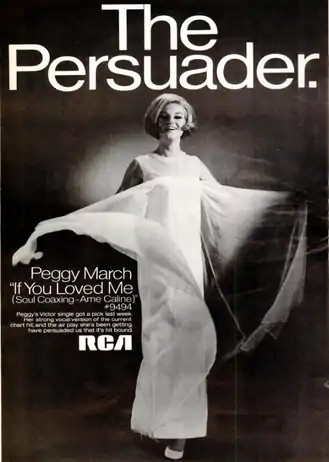Peggy March
Peggy March (born Margaret Annemarie Battavio, March 8, 1948, in Lansdale, Pennsylvania)[1] is an American pop singer. In the United States, she is primarily known for her 1963 million-selling song "I Will Follow Him".[2] Although she is sometimes remembered as a one-hit wonder (despite many strong and promising singles), she continued to have success in Europe well into the 1970s.
Peggy March | |
|---|---|
 March in 1967 | |
| Born | Margaret Annemarie Battavio March 8, 1948 Lansdale, Pennsylvania, U.S. |
| Other names | Little Peggy March |
| Occupation | Singer |
| Years active | 1962−present |
| Website | http://littlepeggymarch.com/ |
Career
Born to an Italian-American family, March was discovered at age 13 singing at her cousin's wedding[2] and was introduced to record producers Hugo & Luigi. They gave her the nickname Little Peggy March because she was only 4 ft 10 in (1.47 m) tall, she was only 13, the record she did with them was "Little Me," and her birthday was in March.[3]
On April 24, 1963,[4] her single "I Will Follow Him" soared to number one on the United States charts.[1] She recorded the song in early January 1963 and it was released on January 22, when she was only 14.[1] March became the youngest female artist with a number one hit, at 15, in late April 1963, a record that still stands for the Billboard Hot 100. The recording also reached number one in Australia, New Zealand, South Africa, Japan, and Scandinavia. It failed to chart in the United Kingdom. It was a translation of the French song "Chariot" recorded a year earlier by Petula Clark.[1] March also became the first white female solo artist to hit #1 on the Billboard R&B chart.
March's success also came with financial trouble. She was a minor and the "Coogan Law" prevented her parents from managing her money. The responsibility was placed on her manager, Russell Smith. It was discovered in 1966 that he had squandered the fortune, leaving her with $500. March graduated from Lansdale Catholic High School in 1966.
Although she is remembered in the United States by some as a one-hit wonder, her singles, "I Wish I Were a Princess" and "Hello Heartache, Goodbye Love". made the Top 30 in the United States, with the latter also reaching #29 on the UK Singles Chart.[5] As with many American artists, March's career in her native United States was derailed in part by the British Invasion, which at the time was pushing many American acts out of popularity, and she had no hits there once the Invasion began in 1964. Recording for RCA Victor, March made 18 singles from 1964 to 1971. She also cut several albums, none of which sold well in the United States.[1] She began having a strong presence in the European and Asian music markets and moved to Germany in 1969.[1] She won the Deutscher Schlager Contest in 1965 and her song "Mit 17 hat man noch Träume" ("At 17 you still have dreams") placed No. 2 in the German Singles Chart. This was followed by German songs like "In der Carnaby Street", "Einmal verliebt — immer verliebt", "Hey, Romeo und Julia" ("On Carnaby Street, Once in Love-Always in Love, Hey, Romeo and Juliet" ... No. 1 in German Charts), "Der Schuster macht schöne Schuhe" ("'The Cobbler Makes Beautiful Shoes"), "Telegramm aus Tennessee", "Die Maschen der Männer" and "Das sind die Träume, die man so träumt". Her commercial success in Germany continued through much of the 1970s;[1] she tried her luck in representing Germany in the Eurovision Song Contest in 1969, only to be placed second in the national final with the song "Hey! Das ist Musik für mich". March made another Eurovision attempt in 1975, when she performed the Ralph Siegel composition "Alles geht vorüber" in the German national contest. Again, she was placed second.
In 1979, she experimented with disco on the album Electrifying, but it failed to achieve commercial success. By 1981 record companies did not renew her contracts, and she moved back to the United States.[1] In 1984, however, Jermaine Jackson and Pia Zadora achieved a major European hit single with the track "When the Rain Begins to Fall",[6] co-written by March. Although not a hit in the UK or in the US, it went to #1 in Germany, France, the Netherlands and Switzerland. In 1998, the song entered the German Top 10 again when covered by rapper Pappa Bear. The cult film Hairspray featured "I Wish I Were a Princess" in 1988, and a retro fad in Germany brought her some continuing success starting in the mid-1990s with the album Die Freiheit Frau zu sein (1995). Her song "I Will Follow Him" was featured in the 1992 movie Sister Act.
March currently works largely in Germany and in the Las Vegas music scene and has also performed at Dick Clark's American Bandstand Theater in Branson, Missouri. In 2004 she was the headliner in Riff Markowitz's Fabulous Palm Springs Follies at the Plaza Theater in Palm Springs, California.[7] In 2005, she released an album of standards, Get Happy, followed by the album Meine Liebe ist stark genug (2008).[8]
In March 2010, March went into the recording studio to record her first album of new, original material in English in over 30 years. A collaboration with Scandinavian songwriter and producer Soren Jensen, the album Always and Forever was released on October 13, 2010. It was followed by a special edition for the German-speaking countries in April 2012,[9] including two duets with the Dutch singer José Hoebee, one of them being a cover version of "I Will Follow Him"; which had also been a #1 single in the Netherlands and Belgium for Hoebee in 1982 (March further recorded a subsequent recording in 2012 for a 2013 release to commemorate the song's 50th anniversary). March also recorded another version of "When The Rain Begins To Fall", as a duet with the German singer Andreas Zaron.
Personal life
In 1969, March married Arnie Harris, her longtime manager. They had one daughter, Sande Ann, born in 1974. In 2013, Harris died.[1] After living in Germany since 1969, in 1999, March moved to Florida.[10]
Discography

Singles
| Year | A-Side | Charts | ||
|---|---|---|---|---|
| US [11] |
GER [12] |
UK [5] | ||
| 1962 | "Little Me" | — | — | — |
| 1963 | "I Will Follow Him" | 1 | 6 | — |
| "I Wish I Were a Princess" | 32 | — | — | |
| "Hello Heartache, Goodbye Love" | 26 | — | 29 | |
| "The Impossible Happened" | 57 | — | — | |
| 1964 | "(I'm Watching) Every Little Move You Make" | 84 | — | — |
| "Let Her Go" | — | — | — | |
| 1965 | "Losin' My Touch" | — | — | — |
| "He Couldn't Care Less" | — | — | — | |
| "Er schoss mir eine Rose" | — | 23 | — | |
| "Mit 17 hat man noch Träume" | — | 2 | — | |
| "Die schönen Stunden gehen schnell vorbei" | — | 25 | — | |
| 1966 | "Tausend Steine" (with Benny Thomas) | — | — | — |
| "Hundert Jahre und noch mehr" | — | 40 | — | |
| "Sweetheart schenk mir einen Ring" | — | 23 | — | |
| "Try To See It My Way" | — | — | — | |
| "Running Scared | — | — | — | |
| 1967 | "Memories of Heidelberg" | — | 5 | — |
| "Romeo und Julia" | — | 1 | — | |
| "How Can I Tell Him?" | — | — | — | |
| "Let Me Down Hard" | — | — | — | |
| "Your Good Girl's Gonna Go Bad" | — | — | — | |
| "Foolin' Around" | — | — | — | |
| 1968 | "Telegramm aus Tennessee" | — | 15 | — |
| "If You Loved Me (Soul Coaxing- Ame Caline)" | — | — | — | |
| "Canale Grande Number One" | — | 18 | — | |
| "Das ist Musik für mich" | — | 21 | — | |
| "Mississippi Shuffle Boat" | — | 30 | — | |
| 1969 | "Yesterday Waltz" | — | 37 | — |
| "Hey" | — | 29 | — | |
| "Bahama Lullabye" | — | 13 | — | |
| "In der Carnaby Street" | — | 16 | — | |
| "Mister Giacomo Puccini" | — | 33 | — | |
| 1970 | "Einmal verliebt, immer verliebt" | — | 23 | — |
| "Die Maschen der Mānner" | — | 29 | — | |
| 1971 | "Sing, wenn du glücklich bist" | — | 35 | — |
| 1972 | "Ich weiss, ich verlieb mich noch heute in dich" | — | 38 | — |
| "Es ist schwer, dich zu vergessen" | — | 30 | — | |
| 1976 | "Du, mach mich nicht an" | — | 47 | — |
| "Costa Brava" | — | 42 | — | |
| 1977 | "Fly Away Pretty Flamingo" | — | 8 | — |
| 1978 | "Oklahoma Bay" | — | 44 | — |
| 1980 | "Dreh' die Uhr zurück zum Anfang" | — | 37 | — |
References
- "Biography by Bruce Eder and Stephen Thomas Erlewine". AllMusic.com. Retrieved February 25, 2009.
- Murrells, Joseph (1978). The Book of Golden Discs (2nd ed.). London: Barrie and Jenkins Ltd. pp. 161/2. ISBN 0-214-20512-6.
- Billboard - May 12, 2001 - Page 60 "... RCA introduced its own teen queen, Little Peggy March. Her first single, a cover version of the song "Little Me" from the Broadway show of the same name, didn't go anywhere, but the follow-up was a different story. "I Will Follow Him" topped ..."
- "This Day in Music". Nielsen Business Media, Inc. Retrieved March 27, 2009.
- Roberts, David (2006). British Hit Singles & Albums (19th ed.). London: Guinness World Records Limited. p. 349. ISBN 1-904994-10-5.
- Jermaine Jackson & Pia Zadora — When The Rain Begins To Fall. swisscharts.com. Retrieved on 2012-04-15.
- Archerd, Army (March 23, 2004). "Just for Variety. (Celebrity Gathering)". Daily Variety. Reed Business Information, Inc. Archived from the original on November 5, 2013. Retrieved March 29, 2013 – via HighBeam Research.
- Peggy March - Meine Liebe ist stark genug. swisscharts.com (2009-07-17). Retrieved on 2012-04-15.
- March, Peggy :: Always and Forever - Artnr 876227-2DA MUSIC Deutsche Austrophon GmbH & Co.KG. Da-music.de. Retrieved on 2012-11-10.
- "March, Peggy- als dem Jungstar die Knie zitterten- Musik & Events- SWR4 Baden-Württemberg". swr.online. March 6, 2018.
- AllMusic - Charts & Awards
- Hit Blanz — Deutsche Chart Singles 1956-1980. Taurus Press. 2000. ISBN 3-922542-24-7.